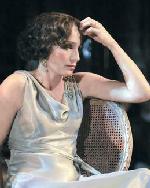SEARCH
REVIEWS
FEATURES
NEWS
Etcetera and
Short Term Listings
LISTINGS
Broadway
Off-Broadway
BOOKS and CDs
OTHER PLACES
Berkshires
London
LA/San Diego
Philadelphia
Elsewhere
QUOTES
On TKTS
LETTERS TO EDITOR
FILM
LINKS
MISCELLANEOUS
Free Updates
Masthead
Writing for us
A CurtainUp  London Review
London Review
 London Review
London ReviewAs You Desire Me
by Neil Dowden
|
I'm like left luggage waiting to be claimed.
---- L'Ignota |

Kristin Scott Thomas as L'Ignota
(Photo: Hugo Glendinning) |
She plays the sultry L'Ignota (The Unknown Woman), the stage name of a Dietrich-style Berlin cabaret chanteuse, who suffers from amnesia and can't remember who she is or where she comes from. As Elma (Arabic for water), she lives with the hack writer Carl Salter (Bob Hoskins) in a sado-masochistic relationship, with Salter's lesbian daughter Mop (Hannah Young) also vying for her attention.
Interrupting this decadent lifestyle comes Boffi (Finbar Lynch) who claims that her true name is actually Lucia (Italian for light) and that her husband is the Venetian aristocrat Bruno Pieri (Richard Lintern). Apparently she was gang raped ten years earlier during the war (hence her loss of memory), then disappeared, and now at last is found again. But when she 'returns' to Bruno's Italian villa doubts surface about who she really is, especially as Bruno has financial reasons for finding his wife alive and Salter turns up with a madwoman from an asylum who he says is the real Lucia.
As always with Pirandello, nothing is as it seems. Does Bruno really recognize L'Ignota as his wife? Does L'Ignota believe she is Lucia? Or does she believe Bruno thinks she is? Her identity is nothing if not fluid, as Pirandello plays a variation on his habitual themes of the illusory nature of reality and the relativity of truth. As L'Ignota tells Bruno, we are all created in the image of other people's subjective emotions, "as you desire me".
Not so much a whodunnit as a "who-is-she?", Kent's tantalising production keeps us in suspense without quite fulfilling Pirandello's aim of "making the intellectual passionate." We need to believe slightly more in the real anguish behind these mind games, which Pirandello had so much personal experience of, as he was eventually forced to put his sometimes violently deranged wife into a mental institution.
Paul Brown's stunning designs take us from Salter's gloomily sensual Berlin pad, to Bruno's elegantly rustic Italian villa, as we go on a journey from darkness to sunlight which is supposed to illuminate the mystery of identity, but actually floods it with white light, so that everything merges, and nothing is distinct.
Kristin Scott Thomas shimmers in the central role (or roles), as she changes from femme fatale Elma to the more homely Lucia, aware that she is always playing a part and lives only in the fantasies of others - there is a real sense of low self-esteem but her damaged psyche is a bit too well hidden. As Salter, Bob Hoskins - a dead ringer for Erich von Stroheim, who took the role on film - growls his way menacingly through proceedings without quite chewing up the scenery, while Richard Lintern's gentler Bruno suggests questionable motives beneath the smoothness. There are nice cameos from John Carlisle and Margaret Tyzack as uncle Salesio and aunt Lena, who are attached to their fond recollections of the younger Lucia -- even if these are false memories.
|
AS YOU DESIRE ME
Written by Luigi Pirandello
Adapted by Hugh Whitemore
Directed by Jonathan Kent
Starring: Kristin Scott Thomas, Bob Hoskins With: Hannah Young, Finbar Lynch, Richard Lintern, John Carlisle, Margaret Tyzack, Richard Trinder, Charlie Walker-Wise, Tim Delap, Tessa Churchard, Andrew Woodall, Stephanie Jacob, Katherine Stark Set Design: Paul Brown Lighting: Mark Henderson Sound: Paul Groothuis Music: Tim Sutton Running time: 1 hour 40 minutes with no interval Box Office: 0870 060 6631 Booking until 22nd January 2006 Reviewed by Neil Dowden based on 2nd November performance at The Playhouse, Northumberland Avenue, London WC2 (Tube/Rail: Embankment/Charing Cross) |





